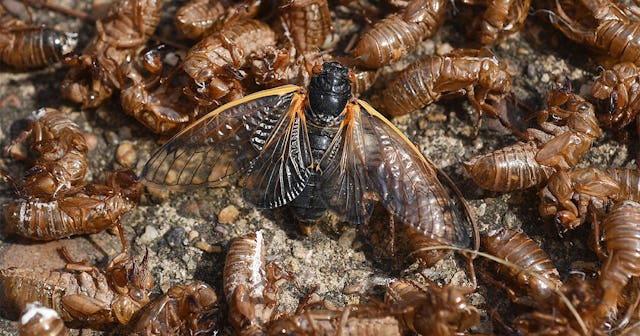Cicadas Are Emerging After 17 Years To Scare The Sh*t Out Of Us

The cicada’s lifespan is only 4-5 weeks long
In this week’s addition of “What in the shit am I seeing with my own eyeballs,” a certain type of cicada that only hatches every 17 years is hatching by the billions (with a B) in certain parts of the United States and they are not here to play. They are, however, here to mate.
If you live in Pennsylvania, New Jersey, Michigan, Illinois, Georgia, Virginia, West Virginia, New York, Indiana, Ohio, Maryland, North Carolina, Delaware, Kentucky, eastern Tennessee or Washington, D.C., congratulations, you can officially scratch, “I’ve seen the Brood X cicada exoskeleton” off your 2021 Bingo card.
These puppies have been laying dormant underground for the past 17 years, feeding on sap from the rootlets of grasses and trees and slowly maturing, ready to emerge right as vaccinated people are beginning to leave their homes and reacquaint themselves with the outside world. Expert timing. Though they aren’t harmful to humans, they have a creep factor of 100% and they don’t travel alone.
People have been sharing videos on social media of their lawns and nearby areas filled with hundreds, even thousands, of cicadas. They shed their exoskeleton, leaving it dangling on trees and in the grass like a scene out of Walking Dead But For Bugs. Sounds scary, right? Here’s an added nugget to add to the terror.
Like, holy shit. Beam me the hell up to wherever this isn’t happening.
Just… absolutely not.
According to the Washington Post, some cicadas can develop a yellow-white fungus that grows inside of them until it actually fills it all the way and pushes out against their abdomens causing the back halves of their bodies to fall off. “Driven by a chemical compound in the fungus — and now lacking butts and genitals — the bugs try to mate like crazy,” leaving some researchers to call them “flying salt shakers of death.” Good luck ever sleeping again.
The lifespan of the Brood X cicadas is only four to six weeks, so they’ll begin dying off in late June and early July. The nymphs, however, will hibernate underground for the next 17 years until we see them again in 2038. While they’re alive, they will spend time mating (with and without genitals), singing loudly, and driving people crazy shedding themselves in public.
Predators do enjoy this time, however, and according to Scientific American, it can be overwhelming to have this sort of insect buffet at their doorstep so quickly. But not to worry. “Consequently, even after the birds, mammals and fish have sated themselves on the plump, defenseless insects,” they said, “plenty of cicadas remain to produce the next generation.” See ya in another 17.